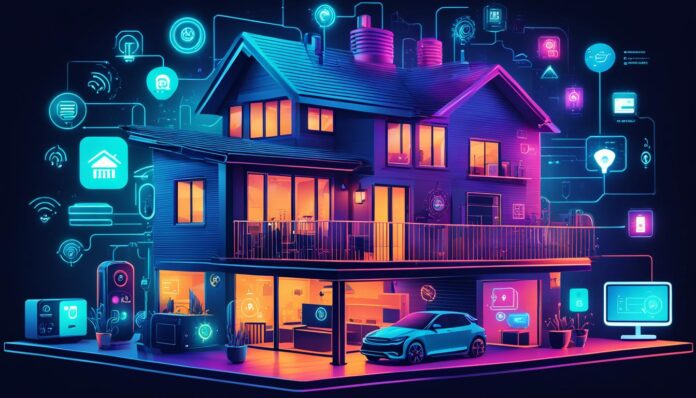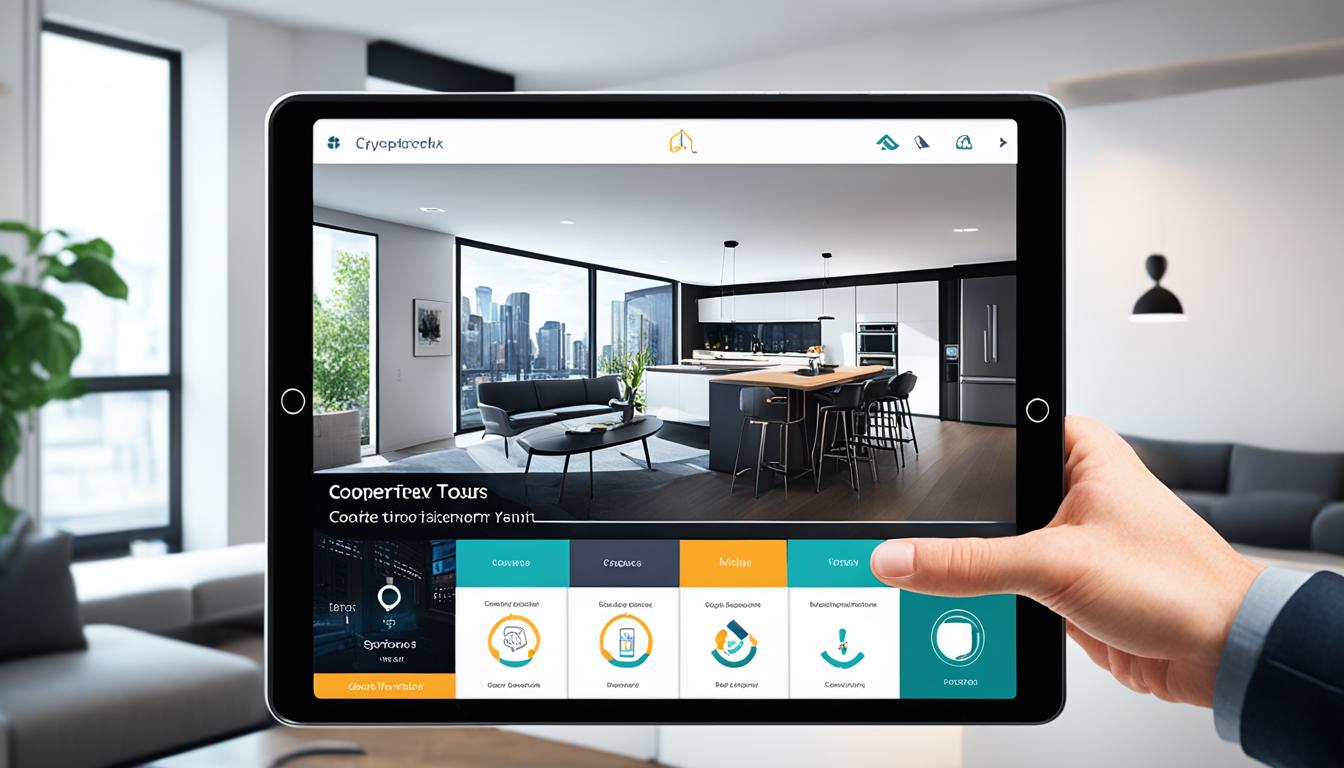
As the smart home market continues to evolve, real estate investors and property managers in the United States are faced with a crucial decision: how to capitalize on the growing demand for connected homes and innovative living solutions. The smart home landscape is transforming rapidly, driven by the explosive growth of the Internet of Things (IoT) and the thriving property technology (proptech) industry. By 2025, the U.S. is expected to have 77.1 million smart homes, presenting a significant opportunity for those who can navigate the key considerations for investing in this emerging technology.
The smart home market trends and the rise of IoT are reshaping the way we interact with our living spaces. Home automation systems are becoming increasingly sophisticated, offering a wide range of features that enhance energy efficiency, property security, and the overall tenant experience. As the proptech market continues to flourish, expected to reach $86.5 billion in North America by 2030, real estate operators are exploring ways to leverage these advancements to streamline operations, attract and retain quality tenants, and create sustainable value for their properties.
However, investing in smart home technology by 2025 requires careful consideration of several key factors. From energy efficiency solutions and voice-controlled assistants to data privacy concerns and smart home security systems, real estate professionals must navigate a complex landscape to unlock the full potential of these innovative solutions. The impact of 5G network and the integration of artificial intelligence further complicate the decision-making process, making it critical for investors to stay informed and proactive in their approach.
Key Takeaways
- The U.S. smart home market is expected to reach 77.1 million homes by 2025, driven by the growth of IoT and the thriving proptech industry.
- Investing in smart home technology can benefit real estate operators by streamlining leasing operations, attracting and retaining quality tenants, and enhancing property management.
- Key considerations include improving energy efficiency and utility cost savings, ensuring property security and asset protection, and integrating voice-controlled assistants and AI.
- Data privacy and security concerns must be addressed to mitigate risks and ensure compliance when investing in smart home solutions.
- The impact of 5G network and the integration of artificial intelligence will further shape the smart home landscape by 2025.
Embracing the Smart Home Market Trend
The smart home market is experiencing a remarkable surge, with the number of smart homes in the U.S. expected to reach an impressive 77.1 million by 2025. This accelerating trend is largely driven by the rise of the thriving property technology (proptech) market, a new and innovative segment within the housing industry.
Proptech: The Thriving Property Technology Market
Proptech encompasses a diverse array of hardware, software, and SaaS products that seamlessly integrate cutting-edge technology with traditional real estate assets. This burgeoning market in North America is projected to experience a robust growth rate, with a CAGR of 16%, expanding from the current $18.2 billion to a staggering $86.5 billion by 2030. This remarkable trajectory underscores the profound impact of technology on the real estate sector.
Increasing Adoption of Smart Home Devices
Alongside the proptech revolution, the adoption of smart home devices is on the rise. A significant 82% of renters now express a strong desire to have at least one smart home device in their living space. This growing consumer demand for smart home technology presents a compelling opportunity for real estate investors to leverage these emerging trends and stay ahead of the curve.
Enhancing Property Management and Tenant Experience
Investing in smart home technology can enhance property management and improve the tenant experience. Smart home solutions can streamline leasing operations by enabling self-guided property tours, which have been shown to increase tour volume by 40% and reduce a property’s time on the market. Surveys indicate that 83% of renters prefer to view a property on their own, and 40% prefer to do so outside of regular business hours.
Streamlining Leasing Operations with Self-Guided Tours
By integrating smart home technology for leasing, property owners can offer prospective tenants the convenience of self-guided property tours. This innovative approach not only improves operational efficiency but also aligns with the preferences of today’s renters, who desire more flexibility and control over the viewing process.
Attracting and Retaining Quality Tenants
Furthermore, smart home technology can help attract and retain quality tenants, as 82% of renters desire at least one smart home device in their home, and they are willing to pay an average of $37.65 more in rent per month for a smart home. By integrating smart home technology, property owners can not only enhance the tenant experience but also increase the overall value of their properties.

What are the key considerations for investing in smart home technology by 2025?
Improving Energy Efficiency and Utility Cost Savings
When considering investing in smart home technology by 2025, one key factor is the potential to improve energy efficiency and reduce utility costs. Smart home devices can help you save up to 30% on your utility bills, a particularly important consideration given the current economic climate. Smart thermostats, for instance, are the most popular smart home device, with 70% of renters stating they won’t rent a unit without one.
Ensuring Property Security and Asset Protection
Another important consideration is how smart home technology can enhance property security and asset protection. Features like smart locks, sensors, alarms, and video doorbells can help prevent property damage and intrusions, safeguarding your investment. By incorporating these security solutions, you can better protect your property and assets.
Integrating Voice-Controlled Assistants and AI
The integration of voice-controlled assistants and artificial intelligence (AI) can also be a key factor when investing in smart home technology. These advanced features can streamline property management and enhance the tenant experience, making your properties more attractive and desirable.
Addressing Data Privacy and Security Concerns
Finally, it’s crucial to address data privacy and security concerns when investing in smart home technology. These systems collect and store sensitive information, so ensuring a secure and compliant solution is essential to mitigate any risks. By prioritizing data privacy and security, you can protect your tenants’ information and maintain their trust.
Conclusion
In conclusion, the key considerations for investing in smart home technology by 2025 include embracing the growing smart home market trend, enhancing property management and tenant experience, improving energy efficiency and utility cost savings, ensuring property security and asset protection, integrating voice-controlled assistants and AI, and addressing data privacy and security concerns. By leveraging the benefits of smart home technology, real estate investors can unlock new revenue streams, create sustainable property value, and stay ahead of the curve in the evolving housing market.
As smart homes become increasingly mainstream, investing in these innovative solutions can provide a competitive advantage and long-term value for property owners and managers. By staying informed and proactive in adopting smart home technology, you can position your real estate investments for success in the rapidly changing housing market of the future.
The integration of smart home technology offers a wealth of opportunities to streamline operations, enhance the tenant experience, and drive sustainable growth for your real estate portfolio. By carefully considering the key factors outlined in this article, you can make strategic investments that will future-proof your properties and deliver lasting value for years to come.
FAQ
What are the key considerations for investing in smart home technology by 2025?
The key considerations include embracing the growing smart home market trend, enhancing property management and tenant experience, improving energy efficiency and utility cost savings, ensuring property security and asset protection, integrating voice-controlled assistants and AI, and addressing data privacy and security concerns.
What is the projected growth of the smart home market in the U.S. by 2025?
The U.S. is expected to have 77.1 million smart homes by the end of 2025, driven by the growth of the Internet of Things (IoT) and the thriving property technology (proptech) market.
How can investing in smart home technology benefit real estate operators?
Investing in smart home technology can benefit real estate operators by streamlining leasing operations, attracting and retaining quality tenants, improving energy efficiency and utility cost savings, enhancing property security, and integrating voice-controlled assistants and AI.
What are the key trends in the property technology (proptech) market?
The proptech market in North America is projected to grow at a CAGR of 16%, from .2 billion currently to .5 billion by 2030. This emerging market encompasses hardware, software, and SaaS products that integrate innovative technology with traditional real estate assets.
How can smart home technology enhance the tenant experience?
Smart home solutions can streamline leasing operations by enabling self-guided property tours, which have been shown to increase tour volume by 40% and reduce a property’s time on the market. Additionally, 82% of renters desire at least one smart home device in their home and are willing to pay an average of .65 more in rent per month for a smart home.
What are the key benefits of smart home technology for property owners?
Smart home devices can improve energy efficiency and reduce utility costs by up to 30%, enhance property security and asset protection, and integrate voice-controlled assistants and AI to streamline property management. However, data privacy and security concerns must also be addressed.
